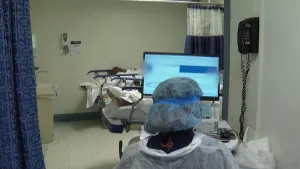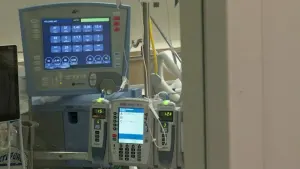UK data suggest hospitalization is less likely with Omicron
Preliminary data suggest that people with the Omicron variant of the coronavirus are between 50% and 70% less likely to need hospitalization than those with the Delta strain, Britain’s public health agency said Thursday.
Share:
More Stories

Nobel in medicine goes to 2 scientists whose work enabled creation of mRNA vaccines against COVID-19
584ds ago1:25

Pharmacies say they have not received orders for newest COVID booster
589ds ago0:21

Biden administration announces $600M to produce COVID tests and will reopen website to order them
596ds ago0:41

Gov. Hochul: Updated COVID-19 vaccine to be available in NY in the coming days
603ds ago2:13

NYSDOH: COVID numbers up with new variant accounting for 17% of new cases
637ds ago2:30

NYSHD: Hospitalizations caused by COVID increase by 22% in a week
645ds ago
Nobel in medicine goes to 2 scientists whose work enabled creation of mRNA vaccines against COVID-19
584ds ago1:25

Pharmacies say they have not received orders for newest COVID booster
589ds ago0:21

Biden administration announces $600M to produce COVID tests and will reopen website to order them
596ds ago0:41

Gov. Hochul: Updated COVID-19 vaccine to be available in NY in the coming days
603ds ago2:13

NYSDOH: COVID numbers up with new variant accounting for 17% of new cases
637ds ago2:30

NYSHD: Hospitalizations caused by COVID increase by 22% in a week
645ds ago
Preliminary data suggest that people with the Omicron variant of the
coronavirus are between 50% and 70% less likely to need hospitalization than
those with the Delta strain, Britain’s public health agency said Thursday.
The U.K. Health Security Agency findings add to emerging evidence that Omicron
produces milder illness than other variants — but also spreads faster and
better evades vaccines.
The agency said that based on cases in the U.K., an individual with Omicron
is estimated to be between 31% and 45% less likely to attend a hospital
emergency department compared to one with Delta, “and 50 to 70% less likely to
be admitted to hospital.”
It cautioned that the analysis is “preliminary and highly uncertain” because
of the small number of Omicron patients in hospitals and the fact that most
were in younger age groups. As of Dec. 20, 132 people had been admitted to U.K.
hospitals with confirmed Omicron, of whom 14 -- aged between 52 and 96 -- died.
Scientists caution that any reductions in severity need to be weighed
against the fact that Omicron spreads much faster than Delta and is more able
to evade vaccines.
The agency’s research said the protection a booster shot of vaccine gives
against symptomatic Omicron infection appears to wane after about 10 weeks,
though protection against hospitalization and severe disease is likely to hold
up for longer.
UKHSA chief executive Jenny Harries said the analysis “shows an encouraging
early signal that people who contract the Omicron variant may be at a
relatively lower risk of hospitalization than those who contract other
variants.”
But she added that “cases are currently very high in the U.K., and even a
relatively low proportion requiring hospitalization could result in a
significant number of people becoming seriously ill.”
U.K. Health Secretary Sajid Javid said the emerging information about Omicron
was “encouraging news,” But he said it was “not very clear yet ... by how much
that risk is reduced” compared to Delta.
The analysis follows two studies, from Imperial College London and Scottish
researchers, that found patients with Omicron were between 20% and 68% less
likely to require hospital treatment than those with Delta.
Data out of South Africa, where the variant was first detected, have also
suggested Omicron might be milder there.
Even if the early studies are borne out, the new variant could still
overwhelm health systems because of the sheer number of infections. The British
health agency said Omicron appeared able to re-infect people more easily than
previous variants, with 9.5% of Omicron cases found in people who had already
had COVID-19 — a figure it said was likely an underestimate.
Countries around the world are looking closely at Britain, where Omicron is
now dominant and where COVID-19 cases have surged by more than 50% in a week.
Britain reported 119,789 lab-confirmed COVID-19 cases on Thursday, the
highest yet during the pandemic and the second day the number has topped
100,000.
Britain’s Office for National Statistics estimated that about 1 in 45 people
in private households in England — 1.2 million individuals — had COVID-19 in
the week to Dec. 16, the highest level seen in the pandemic.
Britain’s Conservative government this month reinstated rules requiring face
masks in shops and ordered people to show proof of vaccination or a negative
coronavirus test before entering nightclubs and other crowded venues in an
attempt to slow Omicron’s spread.
The government said Thursday it would not impose any new restrictions before
Christmas, but might do so soon after.
Officials also urged people to get tested regularly and cut back on
socializing. Many in Britain have heeded that advice, leaving entertainment and
hospitality businesses reeling at what should be their busiest time of the
year.
The government has offered grants and loans to support restaurants, bars,
theaters and other venues, but many say it is not enough to stop them going
under.
Rules set by the U.K. government apply in England. Other parts of the U.K. —
Scotland, Wales and Northern Ireland — have set slightly tighter restrictions,
including the closure of nightclubs.
The government is hoping vaccine boosters will provide a bulwark against Omicron,
as the data suggests, and has set a goal of offering everyone 18 and up a third
shot by the end of December.
By JILL LAWLESS Associated Press
More from News 12
1:45

First-ever Angel Baby Gala held for mothers who lost a child
1:39

Community weighs in on plans to improve safety on notorious stretch of Southern State Parkway
3:20

Long Islanders react to the naming of the Pope Leo XIV
1:30

STORM WATCH: Periods of rain through Friday, chance for thunderstorms
1:40

Port Jefferson considers 4-story hotel to replace former Gap site
0:20
